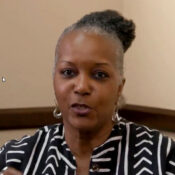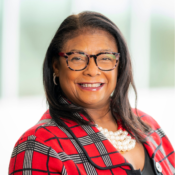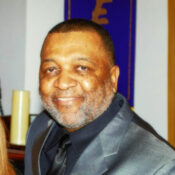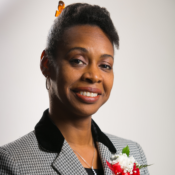Nothing for Us Without Us: Experiences with Community-Academic Partnerships
Day 1: November 14, 2022 | 12:30 p.m. – 1:45 p.m., Marquee Theater
Session Video
Session Materials
- Presentation: Nothing for Us Without Us: Experiences with Community-Academic Partnerships (PDF)
Session Description
Underserved communities are the same groups that are underrepresented in research.
Professor Eva Vivian, president of the African American Health Network and co-investigator with the UW Community-Academic Aging Research Network (CAARN), will discuss the historical trauma of Black Americans’ participation in research and how that broken trust has affected the community’s relationship to and attitudes towards future participation in research.
Only through greater inclusion of underrepresented groups in research can culturally tailored programs, practices and policy close the disparities gap. Researchers who seek to work with and in historically underrepresented communities have a responsibility to prioritize trust-building activities first and foremost.
CAARN brings together community and health system partners with academic researchers to conduct research that is of interest, need and priority to communities to improve the health of older adults and decrease health disparities. CAARN supports researchers in establishing credibility with underrepresented communities through attending community-sponsored events and demonstrating respect for, humility towards, and commitment to the community’s values and culture.
Three panelists will share their perspectives on key elements of a community-academic partnership and best practices for fostering and sustaining trust with underserved communities.
Attendees will leave with a better understanding of:
- How research has evolved in working with historically underrepresented communities
- How academics should approach underrepresented communities with research plans
- How community partnerships can direct research toward health equity and impact
Speakers
Gale D. Johnson
Gale D. Johnson has been the director of the Wisconsin Well Woman Program (WWWP) in the Department of Health Services for more than 20 years. This statewide program is Wisconsin’s component of the National Breast and Cervical Cancer Early Detection Program administered by the Centers for Disease Control and Prevention (CDC). Johnson is a past chair of the CDC Council for Breast and Cervical Cancer Prevention and Control, and a member of the CDC’s National Breast and Cervical Cancer Early Detection and Control Advisory Committee. She is an active member of the Wisconsin Women of Color Network and the African American Health Network of Dane County, and has coordinated health programs for both organizations.
Carola Peterson-Gaines
Carola Peterson-Gaines is a community research associate for the Community-Academic Aging Research Network, a community liaison for Quartz Insurance, and co-chair of the African American Health Network of Dane County. She brings the force of her advocacy to work for equity in health care for some of our most vulnerable citizens — those receiving state Medicaid and Badger Care. Well-known and respected for her outstanding work during the COVID-19 pandemic and in the Madison Community-at-large, she has been exemplary in providing many health resources for marginalized people. She was a recipient of the 2021 UW–Madison Outstanding Woman of Color Award.
Anthony Wade
The Rev. Anthony “Bishop” Wade, is the senior pastor of Second Baptist Church in Madison, and vice president of the General Baptist State Convention. Pastor Wade recently retired from his position as a program manager for the Centers for Disease Control and Prevention (CDC) after 40 years of service. He serves on the leadership team as a community co-investigator on Dr. Earlise Ward’s community-based study that will test and prepare her culturally adapted mental health program for delivery and spread across Wisconsin’s Black communities.
Earlise Ward
Earlise Ward, Ph.D., is a UW Family Medicine and Community Health professor and leads the cancer health disparities initiative at the UW Carbone Cancer Center. She researches beliefs about mental illness and the development of culturally appropriate and effective mental health interventions for African Americans. Her current work is focused on further testing a culturally adapted mental health program delivered in church settings by licensed mental health clinicians and trained pastors.



